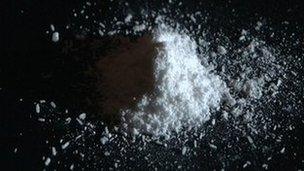UK is Europe's 'addictions capital', says think tank
- Published
- comments

The UK has become the drug and alcohol "addictions capital of Europe", a think tank has warned.
The Centre for Social Justice - set up by Work and Pensions Secretary Iain Duncan Smith - said drink and drug abuse cost the UK £36bn a year.
Its report warned that the UK has become a hub for websites peddling potentially dangerous "legal highs".
The CSJ also criticised the government for failing to tackle heroin addiction and cheaply available alcohol.
The report, No Quick Fix, found that last year 52 people in England and Wales died after taking legal highs, up from 28 the previous year.
The substances, sometimes referred to as club drugs and including Salvia and Green Rolex, are often marketed as bath salts or research chemicals.
But the drugs can be sold legally as long as they are clearly marked "not for human consumption", but have been known to cause permanent bladder damage, blood poisoning and death.
According to the Centre for Social Justice (CSJ), there are now more than 130 UK-registered websites selling the products cheaply by mail order - making postal service workers unwitting drug mules.
'Faster bans needed'
The think tank said one in 12 young people in the UK admitted to having taken legal highs - the highest figure in Europe.
It said a faster system of prohibition was needed to deal with legal highs, as 150 new substances have come on to the market in the last three years, while the government has managed to ban just 15 in the same period.
The report also attacked a failure to offer heroin addicts effective treatment.
A Freedom of Information inquiry found that 55% of councils in England have had funding for residential treatment cut since the coalition came to power, despite Prime Minister David Cameron pushing for more residential programmes.
North/South divide
The report said that almost a third of people in England on drug-substitute prescriptions such as methadone have been on them for four or more years, and one in 25 for more than 10 years.
The CSJ found alcohol dependence among British men was second in western Europe and seventh overall, while alcohol dependence among women is higher in the UK than anywhere in Europe.
One in four adults in England drank to harmful levels, and one in 20 were "dependent drinkers", it said.
The report also found a stark north-south divide in the problem of alcohol abuse, with 26 of the 30 local authorities with the highest rate of alcohol-related admissions in the north of the country.
The CSJ said the government had recognised the dangers of excessive drinking, but criticised its failure to tackle cheap alcohol through minimum unit pricing or a "treatment tax", with revenue put into treatment for addicts.
'Faster on its feet'
Noreen Oliver, chairwoman of the CSJ review, said: "Despite some slow progress in this last three years, much more needs to be done to tackle the root causes of addiction so that people have a better chance of breaking free.
"Alcohol is taking an increasing toll across all services in the UK and new emerging drugs are causing more harm - all the while funding to rehabilitation centres is being dramatically cut and methadone prescribing is being protected."
Crime Prevention Minister Jeremy Browne said the government took the threat of legal highs seriously, describing them as "highs which should not be assumed to be either safe or legal".
"Our Forensic Early Warning System enables us to closely monitor their availability, so we can target activity to reduce demand and supply.
"We are banning whole groups of substances rather than individual drugs and have introduced temporary drug orders which allow us to place harmful substances under control - protecting the public while giving time to our independent experts to prepare more detailed advice."
- Published3 July 2013
- Published2 August 2013
- Published17 July 2013